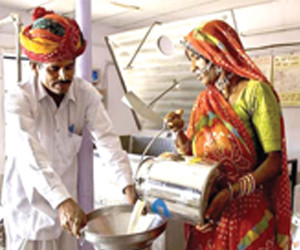Dairy has been one sector where cooperatives have seen an unprecedented success in the State of Gujarat. Going a step further, these cooperatives now plan to adopt new technologies to increase the dairy output. MD Chauhan, Additional Registrar, Cooperation Department, Government of Gujarat, in conversation with Nirav Soni of Elets News Network (ENN) throws more light on the progressive cooperative dairy sector of the State.
What role has been played by the cooperative sector in the past and how is it going to impact the future of Gujarat?
Cooperatives have always helped people collectively as well as individually with various tools and resources. In Gujarat, the cooperative movement has been suc – cessful in dairy, cotton, sugar, oilseed, banking, fisheries, housing etc. Making a humble beginning, the cooperatives have become very large operators, changing the life of small producers/ people in each sector. Gujarat is the pioneer in cooperative sector, particularly dairy cooperatives.
Efforts are being made to encourage cooperatives in other sectors like horticulture etc. They are also going to play a very crucial role in improving the livelihood for rural poor in Gujarat.
What role, do you think, is being played by the cooperative banks in Gujarat towards achieving Financial Inclusion?
Cooperative banks have played an important role in the growth of the State. They went on to achieve success, as members/consumers financed the institution and were involved in its decision-making process. Within small communities, relatively intimate knowledge of each other’s credit and trust worthiness ensured that loans are provided to only those borrowers who would be able to repay them.
The members had to monitor each other, and relatively small and homogeneous membership base of early cooperatives ensured that peer pressure provided incentives to the borrowers to repay. Beyond financial incentives, social relations among members were also a contributing factor in the success of cooperatives. Due to their deep penetration at the grass roots level, the cooperative banks have been playing a major role in promoting financial inclusion.
How do dairy cooperatives contribute towards making the cooperative movement a success?
Before the cooperative movement began, the dairy industry in the Kaira district was being exploited by middlemen, who supplied milk to the consumers. It began as a response to this exploitation and put an end to it. It grew because it responded to the farmers financially as well as with services, and it has thrived ever since because they are owned by farmers, who have a stake in its success. Further, it has been managed by capable professionals and strengthened by dedicated scientists, technologists and workers.
Further, it is worthwhile to note that from a humble beginning, the state’s dairy cooperative programme has grown into one of the largest in the world and is owned by millions of rural producers as the members. It is all the more impressive that it has been accomplished with minimum government intervention.
In Gujarat, there are 16 major dairy plants. Besides creating employment opportunities in urban areas and giving boost to marketing, transport and distribution, these dairy cooperatives have also helped farmers provide a sustainable rural employment programme. A majority of the cooperative members are landless, and are marginal or small farmers who contribute their produce of milk to the cooperatives. For these contributors, the income derived from milk provided their only regular cash flow, thus, transforming dairying into an economic activity.
How is the Registrar of Cooperative Societies (RCS) playing its role for strengthening the cooperative sector in Gujarat?
The State patronage and support for development of cooperative organisations has been the policy. RCS plays a very crucial role in registration, management (including elections of the committee), training and audit of cooperatives.
What various new technological tools should be adopted, especially by the dairy sector, for achieving better business growth?
The biggest problem in the dairy sector is low productivity per animal. To increase the productivity and quality of milk, better quality frozen semen with tested bulls, along with better feeding practices are required. This will also bring in all dairy farmers into the cooperative fold.
Any message you would like to give to the public at large?
Professionally run cooperative sector can improve the economic condition of the small producers through development of value chain linkages – credit, technology and markets. The institutions like Gujarat Cooperative Milk Marketing Federation Ltd can compete with the best in the world and share the gains with the small producers.
The State’s dairy cooperative programme has grown into one of the largest in the world and is owned by millions of rural producers as the members
What is your vision for the cooperative sector in Gujarat?
I would like to see creation and successful operation of farmers’ cooperatives in horticulture sector, so that the farmers could get better prices and high wastages of about 30 to 40 per cent could be avoided through integrated value chain of cooperatives at various levels.
Elets The Banking and Finance Post Magazine has carved out a niche for itself in the crowded market with exclusive & unique content. Get in-depth insights on trend-setting innovations & transformation in the BFSI sector. Best offers for Print + Digital issues! Subscribe here➔ www.eletsonline.com/subscription/





















